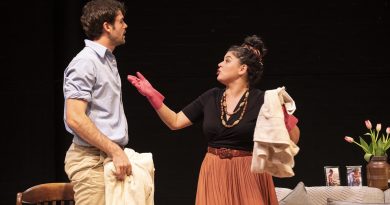Will live theatre survive in the post COVID world?
Last June the European Theatre Convention (ETC) held its first online International Theatre Conference. Like thousands of others have found; the only way for a conference to continue is to hold it online. Supported by the European Union, ETC is one of the cultural networks aiming to connect and strengthen Europe’s cultural sector. The theme; “Connecting the separated – Reopening European Theatres” brought together participants from 25 European countries. They produced a statement voicing a fear shared by cultural institutions the world over:
1) We call upon our Member States and the European Institutions to ensure the survival of our rich and diverse cultural landscape in Europe.
2) We call for an appropriate increase of the Creative Europe budget in 2020 to save cultural places – without this additional support, thousands of theatre and live performing art venues across Europe will shut down by the end of 2020!
3) We call for the need of a strong Creative Europe 2021-2027 programme of the European Union, as the one and only dedicated European funding instrument for the creation and dissemination of art and culture with a European dimension.
(The full statement can be read here).
Red Alert
Earlier this month theatres all over the UK signalled ‘red alert’ for workers in the theatre and music industry. More than 300 venues including London’s National Theatre and Royal Festival Hall turned their lights red as part of a Red Alert campaign. Many cities throughout the UK saw people from the industry marching through the city centres hoping to draw attention to the crisis live performances and performers are experiencing.
Of the two million Europeans who work in the cultural sector, about half are self-employed and most rely on short-term contracts and one-off gigs. Some are better off than others. In France, they benefit from a social security status intended to offer a degree of security. Many Italian freelancers, had unfortunate to wait weeks just to receive a one-off payment of € 600,00. And self-employed British in the industry were told they would receive nothing for at least two months and many still don’t qualify for financial help under the new government scheme.
In an article in the Financial Times, titled ‘How we can save our theatres” the English film and stage director, producer and screenwriter Sam Mendes CBE, called for Britain’s cultural sector to be given investment. Mendes, who has an enormous portfolio of films he has directed from Revolutionary Road to two James Bond films, attacked streaming services for ‘making millions’ during a lockdown that has left the theatre industry ‘mortally wounded’.
Netflix and Amazon Prime have had a staggering rise in subscriptions since lockdown. Sam Mendes points out that live theatre is where the talent is nurtured that these streaming companies are getting rich from. Should it collapse it will affect them also.
The historic Globe theatre could quote Shakespeare’s Hamlet: “To be or not to be, that is the question” if it weren’t so painful. The Globe has been staging the Shakespeare’s work in London since 1997 when the company opened the doors of a reproduction of the original Elizabethan playhouse that stood near the same site until it was destroyed by fire in 1613. The playhouse operates on a nonprofit basis, without any regular government support. But now it is calling on the government to help it survive.
It’s not just about opening theatre doors. It takes months of preparation to put on a show. A large performance can have as many as 200 people involved. Even if theatres are allowed to open in the autumn, it will probably be next year before they can put on a performance.
Many wonder why can we fly on planes but not visit indoor theatres, or why pubs opened but opera houses remained closed. The hope was that the culture industry would bounce back as soon as lockdown restrictions were lifted. But most cultural venues are facing months of uncertainty.
Life without theatre is not an option
As we seem to be going into a second wave of the pandemic, and the WHO are predicting two years before there is a vaccine, the big question is whether live theatre will actually survive?
In Europe the EU’s cultural agency Creative Europe has sped up the implementation of its Euro 48.5 million 2020 grant programme to help bring relief to organisations otherwise might cease to exist. Most national governments have announced specific measures to prop up their National cultural Institutes. This ranges from small grants to loans and billion Euro schemes such as in Germany, France and the UK. In July the UK government said it will give 1.57 billion pounds to help UK theatres, galleries, museums and other cultural venues. They have made a five-stage plan of how venues will start to operate again with two allowed now and the other three pending pandemic developments. No one can say when those further three will be able to be implemented, but a start is being made.
Following on from his appeal in the Financial Times, Sam Mendes set up a fund to help the theatre industry. The fund received £500,000 donation from Netflix and is receiving hundreds of applicants looking for assistance.
Can we help?
Many individuals ask themselves what they can do. If many asked themselves that question and took action, then live theatre would be guaranteed into the future. Here are five simple ideas you can do to help:
- Continue to be one of the loyal audience members. Donate what you might have spent on tickets anyway. It might not seem like much but remember it was ticket sales that contributed to a theatres survival before we ever heard of COVID-19;
- Donate money or time to a cultural venue or cultural charity;
- Buy a membership or subscription;
- Organise fundraising activities. Such activities double up as awareness-raising and might bring in more donations;
- Write to your local MP.
No one has a crystal ball predicting how life will be once the pandemic is a thing of the past. But what is for sure is that theatre has been a part of human life for at least 2,500 years. It has survived plagues, wars, uprisings, the rise of technology. Life without live theatre is not an option.




